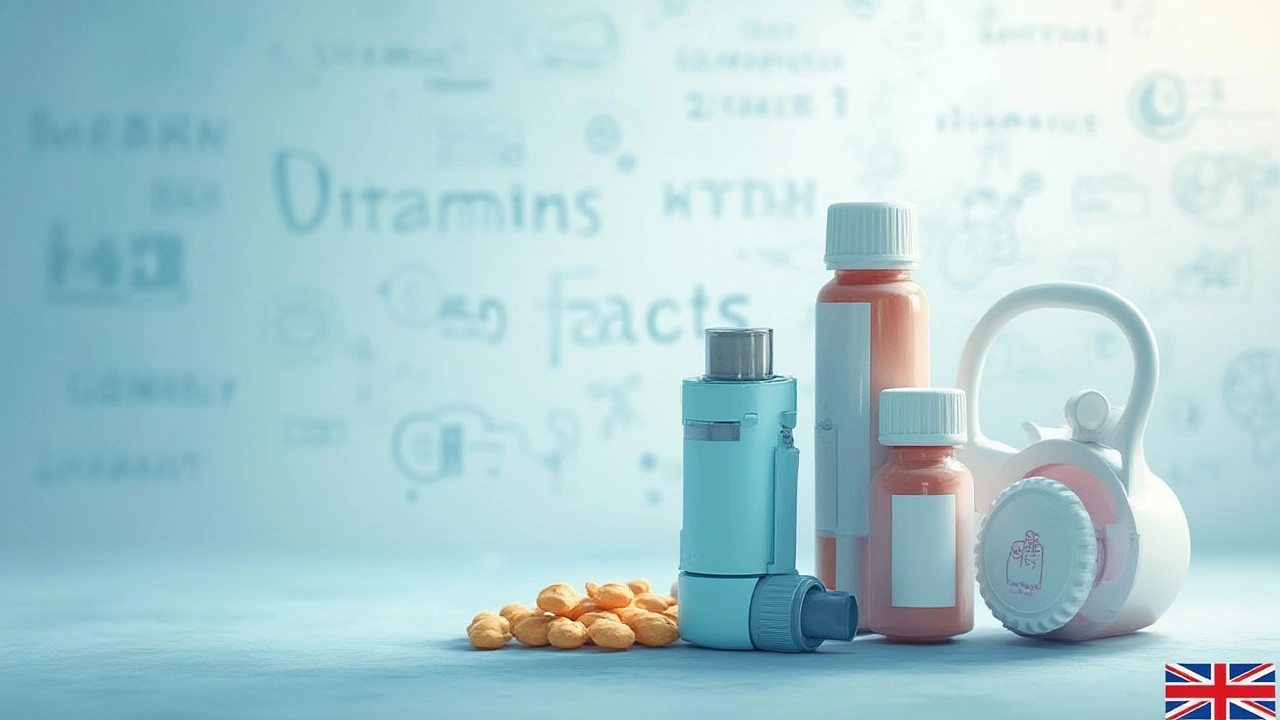Breathe deeply. Now, imagine feeling that tightness in your chest when you can’t. If you’ve ever had asthma, you know how brutal it feels to run out of your inhaler. People desperately try to find fast, reliable alternatives when albuterol isn't at their fingertips. The shelves in UK pharmacies are stacked with promises: epinephrine inhalers from the US, herbal tablets, salt pipes, even gadgets promising to transform your lung strength. But do any of these actually work like albuterol? Or are we chasing shadows across the counter?
Why Albuterol Remains the Gold Standard
Albuterol’s reputation didn’t appear out of thin air. First approved in the UK in the 1970s, albuterol (known as salbutamol here) has proven itself through decades of data. When an asthma attack hits, it works in minutes, not hours. It relaxes the smooth muscle in your airways, stopping the wheeze and that drowning feeling before it gets out of hand. Doctors trust it because it’s been battle-tested – not just in neat clinical studies but in ambulance sirens and rain-soaked football fields all over London.
The magic of albuterol is its selectivity. It acts mostly on the beta-2 receptors inside your lungs, rather than the heart or blood vessels. That’s why it’s both effective and relatively safe if you follow your doctor’s dosing instructions. Side effects can happen – hand shakiness, a bit of a racing heart, or anxiety – but for most, these fade quickly after each puff.
Here’s the kicker: Overuse or relying on it too much? That’s risky. It can mask the need for stronger controller medications like inhaled steroids. People often don’t realize that if you need albuterol more than twice per week (outside of exercise), you should talk to your GP. It might hint at poor asthma control, which is a big red flag for something worse down the track.
Still, prescriptions aren’t always at hand. Pharmacies in the UK are strict about handing out albuterol without one, so people start looking for alternatives. The question keeps coming up: can you buy something similar over the counter and actually trust it in an emergency?
Epinephrine Inhalers: Old School, Still Around
Back in the early 20th century, epinephrine inhalers were the go-to asthma fix. They’re still available without prescription in some countries like the US, under names like Asthmanefrin. But before you order one online, let’s break down how they actually compare to albuterol.
Epinephrine isn’t picky. It hits all sorts of adrenergic receptors, not just the beta-2 type in your lungs. So, besides opening your airways, it also has a higher risk of causing a pounding heart, jitteriness, raised blood pressure, and even anxiety attacks, especially for people who already have heart conditions. In short: It’s less precise and more likely to make you feel rubbish. That broad effect profile is why doctors moved away from epinephrine as soon as drugs like albuterol came on the scene.
In an “all else fails” moment – say, lost inhaler, no other option, and a real emergency – some people do use OTC epinephrine inhalers. There’s even research showing they can relieve mild asthma symptoms in a pinch. But no UK professional body recommends them as first-line therapy. In fact, the NHS does not approve any inhaler containing epinephrine for asthma here. You won’t find them in high street pharmacies on this side of the Atlantic.
If you’re desperate, ordering an epinephrine inhaler online can be risky. Many sources aren’t regulated. There’s the added danger of not knowing what’s actually inside. Plus, customs lump epinephrine inhalers in with controlled medicines, so you might lose your money or get into legal hot water.
Bottom line: Epinephrine inhalers are a relic you might use if you have absolutely nothing else, but they’re not a safe substitute for over the counter substitute for albuterol. You can check out other options and details in this comprehensive article: over the counter substitute for albuterol.

Supplements and Herbal Options: Science or Snake Oil?
Let’s face it – if you’ve ever Googled “natural asthma remedies,” the avalanche of supplements and herbs is overwhelming. From magnesium tablets to ginseng powders, there’s no shortage of miraculous claims. But which ones, if any, can help when you’re gasping for air?
Packed pharmacy shelves often feature products like quercetin, mullein extract, boswellia, or even vitamin C megadoses. Some supplement companies slap on labels boasting “lung support” or “respiratory aid” for that extra nudge at checkout. But does the evidence stack up?
Take magnesium, for instance. There is real data showing intravenous magnesium can help in severe asthma attacks in the hospital setting. That’s IV, not a fizzy orange tablet from Tesco. Oral magnesium? The science is much thinner. Reviews keep finding little to no benefit for asthma relief, especially in acute situations.
Herbs like boswellia or licorice root pop up a lot in health shops. Small studies from India or China raise hopes for reduced inflammation and improved breathing. But these are almost always tiny, poorly-designed trials that don’t translate into real-world solutions. On top of that, supplements can interact with asthma medications or mess with your blood pressure.
Eucalyptus oil is a classic folk remedy – steam inhalation opens up the nose, sure, but it does nothing for constricted lower airways. Same goes for salt pipes or nebulizers with saline: Some people claim they help them loosen mucus, but when it comes to actual bronchospasm, the effect is negligible.
Vitamins like D and C are useful if you’re deficient, but swallowing more than your body needs doesn’t protect against asthma attacks. The only supplement with a grain of promise is black seed oil (nigella sativa) – a handful of studies suggest a mild anti-inflammatory effect. Still, it doesn’t work fast and it’s nowhere near as reliable as an inhaler.
Here’s a simple table summing up some popular supplements, their sources, and evidence for asthma relief:
| Supplement/Herb | Type | Any Evidence? | Side Effects |
|---|---|---|---|
| Magnesium (oral) | Mineral | Weak/no clinical benefit for asthma | Diarrhoea, GI cramps |
| Boswellia | Herbal | Tiny studies, poor-quality data | GI upset, drug interactions |
| Nigella sativa | Herbal oil | Some benefit in small studies | Allergy, GI upset |
| Vitamin D | Vitamin | No effect unless deficient | Nausea, high calcium |
| Eucalyptus oil | Essential oil | No effect on bronchospasm | Toxic if swallowed |
So, if you’re skipping your inhaler in hopes of an herbal miracle, be careful. Not only has real benefit not been proven, but some supplements could even make things worse by delaying real treatment or causing side effects.
Breathing Trainers and Devices: Fitness for Your Lungs?
Walk into a big Boots or browse Amazon, and you’ll spot gadgets that promise “stronger lungs” or “better breathing.” These range from dumbbell-shaped ‘Powerbreathe’ resistive trainers to fancy smartphone-connected spirometers. Some folks with asthma or COPD, frustrated with their reliance on meds, give these trainers a go. But do they deliver?
Respiratory muscle training isn’t quackery in itself. Olympic cyclists use it to up their stamina. One UK study with children and adults found that after a few weeks of training with resistance devices, asthma patients reported fewer symptoms and improved quality of life. The basic idea is to strengthen your diaphragm and teach you to regulate your breathing, so airways don’t get as twitchy.
Here’s the catch: No breathing trainer fixes acute bronchospasm. If your airways are already narrowed, no amount of resistance breathing is going to open them up. They help with prevention, not emergencies. Using these gadgets means plugging away for weeks, not grabbing a quick fix when you’re wheezing hard.
Biofeedback apps are another trend, gamifying breathing techniques like the Buteyko method or pursed-lip breathing. These can help some people manage anxiety that makes asthma worse, and may reduce symptoms in mild cases, but don’t replace medical therapies either.
- Try a coach or physiotherapist before investing loads in gadgets. Proper technique matters more than price.
- Use breathing trainers consistently, not just during flare-ups.
- If you find measurable benefits (longer exercise, better peak flow scores), keep them in your kit – but never use them to replace your rescue inhaler.
Bottom line: Breathing trainers have potential but are slow-burn. They’re for building long-term resilience, not dousing the fire of an asthma attack.

What Works—and What Should You Actually Do?
Here’s where things get real. If you need quick relief from asthma, nothing legal over the counter in the UK stacks up to a prescribed albuterol inhaler. Epinephrine inhalers are riskier and awkward to get. Supplements and alternative remedies lack solid proof and work way too slowly (if at all), while breathing trainers pay off only after patient practice. This means no genuine shortcut for that fast relief puff.
So what’s the best play if you’ve run out and can’t get to your GP?
- Call your local chemist, explain the situation. Some pharmacies run urgent supply services if you can demonstrate a previous prescription.
- Your asthma action plan (everyone in the UK should have one) matters—follow it especially during pollen, pollution or if you get sick.
- Don’t waste time on magical thinking. Get medical help fast if symptoms are severe—ambulance crews here carry albuterol and nebulised bronchodilators.
Remember, the most dangerous myth is thinking you’re safe without your prescribed inhaler. Always keep a spare at home, work, and even out for a pint. Asthma may be common, but it’s deadly when ignored. If you’re desperate, read up on what’s out there but treat the hype with a massive grain of salt. Curious about other possibilities? Here's a solid roundup of current alternative options: over the counter substitute for albuterol.
If you’re searching for something OTC because prescriptions are out of reach or healthcare is expensive, don’t take silent risks. Speak out, lean on asthma organizations, and push for better access. Dodgy inhalers and sketchy capsules look appealing until you’re the one gasping for air at the wrong moment. Don’t let false hope cost you a single breath.


Michael AM
Running out of your rescue inhaler is terrifying and there’s no true OTC substitute for albuterol.